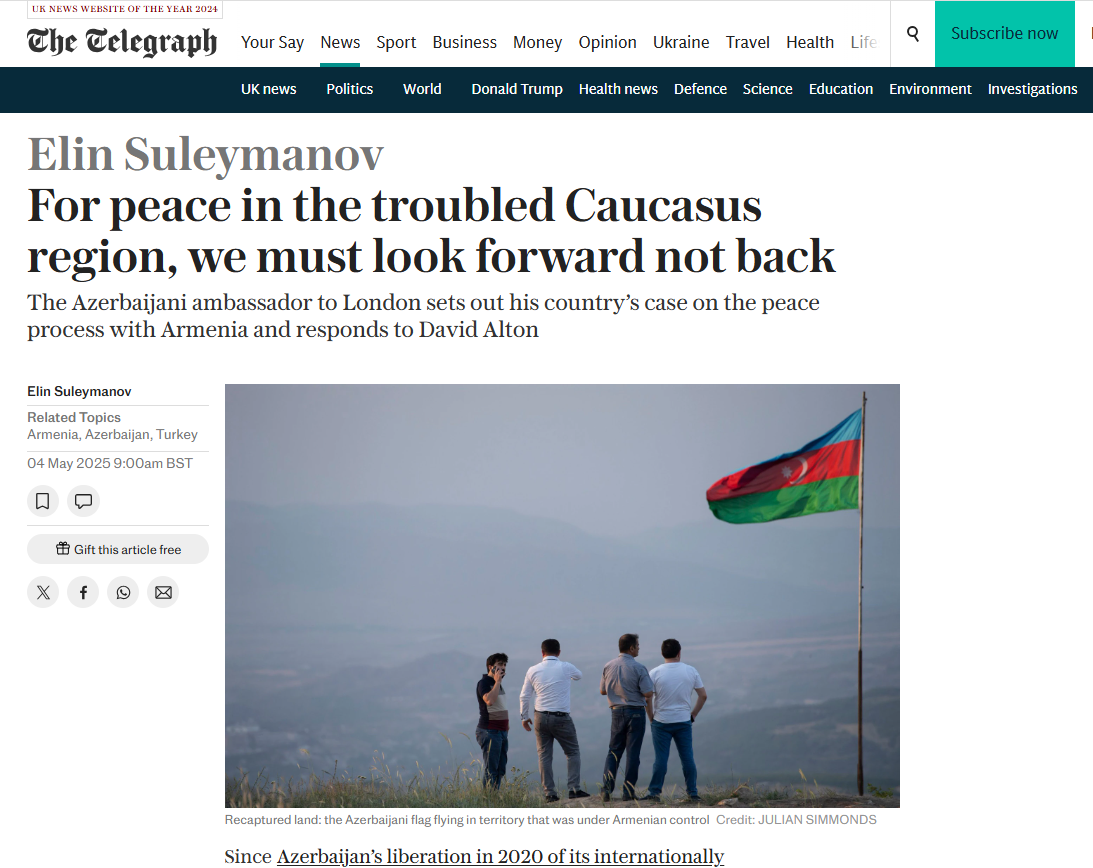BAKU, Azerbaijan, May 5. Azerbaijan sincerely seeks normalization with Armenia and long-term security in our region, said Elin Suleymanov, Azerbaijan’s Ambassador to the United Kingdom, in a recent op-ed for The Telegraph, Trend reports.
Suleymanov offered a candid assessment of the evolving peace process between Azerbaijan and Armenia, underscoring Baku’s consistent push for stability in the South Caucasus and warning against ideological distortions from abroad.
Reflecting on the aftermath of the 2020 conflict, the ambassador highlighted that “having secured a decisive military advantage, Azerbaijan offered a peace treaty and normalisation of relations with Armenia, including the reopening of transport and communications.” Yet, he argued, Armenia has repeatedly stalled the process, only recently agreeing to terms that Azerbaijan had proposed years earlier.
The ambassador welcomed the finalization of the peace agreement text as a milestone, emphasizing that it was reached through direct bilateral talks without outside interference. “The ineffectiveness of external mediation,” he noted, “was exemplified by the dysfunctional OSCE Minsk Group, now defunct in all but name.”
However, Suleymanov pointed out that a signed agreement alone is not enough. Drawing a parallel with the 1994 Budapest Memorandum that failed to prevent war in Ukraine, he cautioned: “The text of an agreement is not alone sufficient to engender lasting peace.”
One of the key obstacles to real normalization, he argued, lies within Armenia’s own Constitution, which “still essentially calls for the annexation of Azerbaijani lands.” This, he said, directly contradicts the very principles of sovereignty and territorial integrity enshrined in the peace agreement. “Vocal Armenian political forces opposed to any peace with Azerbaijan whatsoever continue to make territorial claims to our internationally recognised land – and point to their constitution as justification.”
Still, Suleymanov noted signs of changing attitudes inside Armenia. “Even the Armenian Prime Minister Nikol Pashinyan has acknowledged that Azerbaijan’s liberation of its lands has given Armenia the opportunity to now focus on its own sovereignty as well as greater room for manoeuvre on foreign policy.” He also suggested that “even the most zealous Armenian nationalists seem to be finally recognising that this narrow, ethnicity-driven political agenda has been the root cause of the constant conflict.”
The article also took aim at diaspora groups and Western politicians who, in Suleymanov’s view, choose ideology over facts. He singled out British peer Lord Alton for frequently criticizing Azerbaijan and backing controversial figures such as Ruben Vardanyan, the Russian-linked oligarch who led separatist forces in Karabakh. Suleymanov noted that Vardanyan had been “parachuted illegally into Azerbaijani territory from Moscow” and has been sanctioned by Ukraine for supporting war.
Concluding on a more conciliatory note, Suleymanov referenced the late Pope Francis, who during a visit to Azerbaijan praised its culture of inclusivity and called for a genuine peace. “A peace free from double standards and dividing narratives,” the ambassador echoed, urging all parties to move beyond ideology toward lasting reconciliation.







